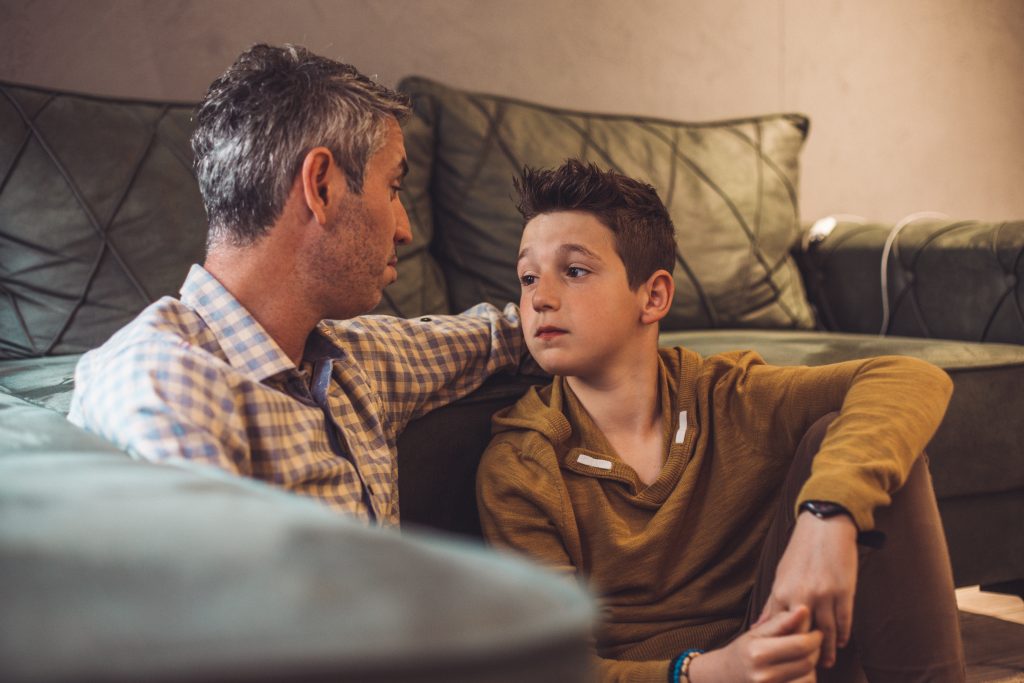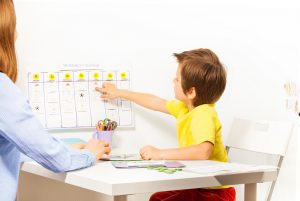Month: June 2021
ADHD and Negativity: Why ADHD kids and teens say “No” and how to help them communicate
 As a parent of a neurodivergent child with ADHD, you might struggle with understanding symptoms of ADHD and negativity. It seems like you’re constantly catching your child or teen with a negative attitude. It’s ‘No’ to this and ‘No’ to that! You might wonder if this is normal during childhood and adolescence or more so for kids with ADHD. Let’s explore these ‘No’s’ and see whether they’re simply an expression of negativity or something more.
As a parent of a neurodivergent child with ADHD, you might struggle with understanding symptoms of ADHD and negativity. It seems like you’re constantly catching your child or teen with a negative attitude. It’s ‘No’ to this and ‘No’ to that! You might wonder if this is normal during childhood and adolescence or more so for kids with ADHD. Let’s explore these ‘No’s’ and see whether they’re simply an expression of negativity or something more.
Jared and his family’s summer schedule frustration
Recently, I was talking with Jared, an eighth grade boy who was complaining about being bored now that school is over to his mom, Savannah and me. “There’s nothing to do except gaming, and you only let me do that for two hours in the morning and two in the afternoon. What else am I supposed to do?”
 His mom gently suggested going back to some activities that had previously interested him before COVID—piano lessons, basketball, tennis or making movies with his friends. “No, no, no. I don’t want to do any of those!” His mom turned to me and said, “I used to do this to my mom. There’s never a right answer.”
His mom gently suggested going back to some activities that had previously interested him before COVID—piano lessons, basketball, tennis or making movies with his friends. “No, no, no. I don’t want to do any of those!” His mom turned to me and said, “I used to do this to my mom. There’s never a right answer.”
I wondered aloud if his ‘No’s’ actually meant, ‘Forget about it,’ or, ‘I’m not sure and need to think about it.’ Tennis and making movies were hard ‘No’s.’ Piano and basketball were more of an, ‘I’ll think about it.” I asked him why he doesn’t just say that and he shrugged, “I don’t know…I just can’t think about all that stuff at once.”
We talked about how saying ‘No’ flat out like that gives him space to think about something without any pressure. The ‘No’ seemed to be less of a problem with ADHD and negativity, and more of a request for space to think. The gears in my mind immediately started turning.
The impact of ADHD on negativity
Due to working memory and processing speed challenges, kids with ADHD and negativity challenges are often feeling overwhelmed—emotionally, cognitively or socially. They simply lack adequate amounts of dopamine and norepinephrine in their brains to help them process and recall information efficiently. Over time, becomes hard to keep up with all of the activity around them.
These are mostly unconscious cognitive processes that kids struggle to articulate. Instead, what most kids tell me is that they simply feel flooded and agitated. They lash out and regret their words and actions afterwards. They might also be coping with anxiety or symptoms of rejection sensitive dysphoria. These challenges that commonly occur with ADHD can appear as negativity.
Negativity in public vs. at home
 Kids and teens with ADHD try to muddle through and manage these feelings at school and with friends. However, they don’t feel obligated to make the same efforts at home.
Kids and teens with ADHD try to muddle through and manage these feelings at school and with friends. However, they don’t feel obligated to make the same efforts at home.
Jared once told me, “I’m not going to be suspended from my family.” They don’t have to hold it all together with people they know love them, and whom they love too (despite any actions to the contrary). But this doesn’t mean you have to endure inappropriate language, fury and sometimes aggressive behaviors. This doesn’t foster a positive connection between you, nor does it teach your child or teen how to manage their intense feelings effectively.
Check in with your child or teen about ‘NO.’
In a calm moment, sit down with your child and talk about ‘NO.’ Put on your Sherlock Holmes hat, take out your curiosity and gather some information about your child’s challenges with ADHD and the negativity that you experience.
Reasons and meanings behind ‘NO’ often depend on the situation, so it might help to bring up some specific instances for an effective discussion. Is saying ‘NO’ about setting appropriate limits, expressing their opinion, being contrary, slowing things down or something else? Maybe it’s a combination of things. Brainstorm alternatives to ‘NO,’ and come up with a few words or phrases to use when they need time to think about something.
Create a plan with your child or teen on how to address oppositional behavior
To address ADHD, negativity and flat-out oppositional behavior, you have to create a collaborative action plan.
-
-
- Start by discussing some plans and ground rules about explosions or meltdowns in your home.
- Ask your ADHD child or teen to describe what words or actions constitute over-the-top moments, and then offer some of your observations. To avoid blame, use the phrase,“I’ve noticed that things get out-of-control when…” and be as specific as you can.
- Consider sharing something about what triggers you and how you’d like to change your response. This normalizes their experience which reduces shame about struggling with meltdowns in the first place.
- Together, write down a list of your combined ideas and ask them to link these behaviors to logical consequences. Remember, punishments for kids don’t teach any skills. Kids with ADHD and feelings of negativity need tools to help them calm themselves and communicate in these tricky moments.
- Plan to revisit your plan weekly and post it in the kitchen where everybody can see it.
-
Acknowledge your ADHD child or teen’s efforts to improve communication
 Shifting away negativity takes time, repetition and encouragement. It involves identifying emotions and needs, and then communicating them effectively. Therefore, it’s important to allow your child the chance to process and respond at their own pace. It’s a cycle of practice, stumble, try again and practice some more. Regardless of your own frustration, try to acknowledge and validate any and all efforts your child or teen shows.
Shifting away negativity takes time, repetition and encouragement. It involves identifying emotions and needs, and then communicating them effectively. Therefore, it’s important to allow your child the chance to process and respond at their own pace. It’s a cycle of practice, stumble, try again and practice some more. Regardless of your own frustration, try to acknowledge and validate any and all efforts your child or teen shows.
Managing ADHD and negativity is tough parenting work. Make sure that you practice your own self-care and have support for yourself from close friends, family members, a therapist or coach to assist you. The more you can respond instead of react and regret, the better it will be for everyone in the family.
Read more blog posts:
- ADHD, Defiance and COVID: What can you do instead of yelling?
- ADHD and Anger in the Family: Manage Outbursts with STOP-THINK-ACT
- Create Successful Neurodiverse Family Outings Today: Time to connect with the great outdoors!
Watch on YouTube:
- ADHD and Oppositional Defiance (ADDitude Mag Q&A with Dr. Saline)
- Anger Management with ADHD (ADDitude Mag Q&A with Dr. Saline)
- How to Get Your Teens to Open Up (WWLP 22 News interview with Dr. Saline)
Deeper dive: https://drsharonsaline.com/product/whats-up-with-all-this-anger/ https://drsharonsaline.com/product/home-seminar/
ADDitude Mag: When ADHD Drains and Strains Sibling Relationships
Dads with ADHD: How to use your unique strengths to assist your kids
 As a father with ADHD, you know firsthand what your neurodivergent child or teen lives with every day. Because boys are more likely than girls to be hyperactive or impulsive, ADHD in boys is often displayed and diagnosed earlier and more often. But you may or may not have been assessed when you were growing up. And, although you have symptoms and traits of ADHD, you may still not have a formal diagnosis. Whether you’ve struggled personally or professionally with issues related to concentration, emotional regulation, organization, impulse control or productivity, you may find parenting particularly challenging. It can tough to be collaborative, stay curious and validate what’s going well when you wrestle with impatience, frustration and anxiety. Yet, there are many benefits that are unique to dads with ADHD.
As a father with ADHD, you know firsthand what your neurodivergent child or teen lives with every day. Because boys are more likely than girls to be hyperactive or impulsive, ADHD in boys is often displayed and diagnosed earlier and more often. But you may or may not have been assessed when you were growing up. And, although you have symptoms and traits of ADHD, you may still not have a formal diagnosis. Whether you’ve struggled personally or professionally with issues related to concentration, emotional regulation, organization, impulse control or productivity, you may find parenting particularly challenging. It can tough to be collaborative, stay curious and validate what’s going well when you wrestle with impatience, frustration and anxiety. Yet, there are many benefits that are unique to dads with ADHD.
Here are 5 ways that dads with ADHD can especially connect with their kids:
1. Dads with ADHD can hyperfocus on their kids.
 Having a parental figure who can zoom in and pay full attention on an activity is very useful for kids with and without ADHD. Dads who narrow their focus on doing something with their children can make them feel like they are the most important person in the world. This intense concentration facilitates meeting kids where they are, engaging in active listening, and working through small difficulties with precision. When you are hyperfocused, your ability to be an ally and your curiosity about your child opens doors to conversation and comforting support. Figure out some activities that you both enjoy, put down your phone and shine your spotlight of attention on your son or daughter.
Having a parental figure who can zoom in and pay full attention on an activity is very useful for kids with and without ADHD. Dads who narrow their focus on doing something with their children can make them feel like they are the most important person in the world. This intense concentration facilitates meeting kids where they are, engaging in active listening, and working through small difficulties with precision. When you are hyperfocused, your ability to be an ally and your curiosity about your child opens doors to conversation and comforting support. Figure out some activities that you both enjoy, put down your phone and shine your spotlight of attention on your son or daughter.
2. They help to normalize what makes children different.
 Men who have ADHD are learning to cope with their differences through structure, education, and a whole lot of patience. Dads with ADHD are doing this while raising kids who may share similar strengths and challenges. Hopefully, as an adult, you’ve reached a point where you value your uniquely wired brain and learned to live with it with compassion and pride. Watching their fathers learn to accept and appreciate their quirks in a healthy way can truly help children to develop more positive thoughts around what makes them different and special.
Men who have ADHD are learning to cope with their differences through structure, education, and a whole lot of patience. Dads with ADHD are doing this while raising kids who may share similar strengths and challenges. Hopefully, as an adult, you’ve reached a point where you value your uniquely wired brain and learned to live with it with compassion and pride. Watching their fathers learn to accept and appreciate their quirks in a healthy way can truly help children to develop more positive thoughts around what makes them different and special.
3. They can often better understand their children’s emotions.
All children experience frustration, anger, sadness and fear. During these moments, they may well lash out verbally or physically in aggressive ways. These big feelings can be confusing as well as overwhelming. Dads who live with ADHD may well understand those feelings differently than a neurotypical parent. Men with ADHD often struggle with anger management, intense shame and fear about not measuring up. Dads with ADHD have to go deal with these tougher emotions while supporting and guiding their kids towards developing self-regulation tools that are actually hard for them too. Consider joining with your son or daughter on some aspect of self-Control that you could both improve together. When you work collaboratively, you can model and share emotional intelligence and hard-earned coping strategies.
4. They are often natural problem solvers.
Dads with ADHD have experience learning about themselves and, if they’re diagnosed, what an ADHD diagnosis entails. Because of this, they have cultivated many tools to manage challenges. They have natural empathy and useful insights that can help with problem-solving. Our children want to feel heard and assisted with their troubles. However, they also need a good sounding board for their own ideas. Whether it’s working through math homework, trying to deal with a bully at school, or deciding what new sport to try, you can step up and be the confidante your son or daughter needs. Your support assists them to build resilience and confidence to figure out future issues as well.
5. They can help children develop healthy life strategies.
 When parents develop healthy coping mechanisms for the many challenges that life brings forth, they demonstrate how to engage in self-care. They also show how routines and relationships can bring meaning and satisfaction to life. Children, always watching and listening, will learn these tools and values from early on through adulthood. Parents with ADHD have a unique opportunity to lead by example while not expecting perfection from themselves. As a father with ADHD, you have a chance to help your kids dismantle gender stereotypes and that having strengths and vulnerabilities and asking for help are normal parts of being human.
When parents develop healthy coping mechanisms for the many challenges that life brings forth, they demonstrate how to engage in self-care. They also show how routines and relationships can bring meaning and satisfaction to life. Children, always watching and listening, will learn these tools and values from early on through adulthood. Parents with ADHD have a unique opportunity to lead by example while not expecting perfection from themselves. As a father with ADHD, you have a chance to help your kids dismantle gender stereotypes and that having strengths and vulnerabilities and asking for help are normal parts of being human.
Here are a few specific self-care areas that dads with ADHD can focus on:
-
-
-
Getting enough sleep.
Sleep deprivation is known to exacerbate ADHD symptoms. Your immune system’s ability to defend you from outside stressors is highly reliant on factors such as the amount of sleep you get on a regular basis. Without adequate sleep, it can be difficult to focus on simple tasks throughout the day. Sleep deprivation can also affect memory and reduce your problem-solving skills, which are already pain points with ADHD. Practice regular sleep and wake times and set up routines (with incentives if necessary) to facilitate this process.
-
Keeping a family planner or calendar.
Many parents use a calendar, planner, or to-do list to stay on top of everyday tasks. Dads with ADHD often integrate planning functions in their daily work life so why not apply this skill at home? Use a whiteboard, Post-it notes on a wall calendar or a chalkboard to set up daily and weekly routines. This helps kids see what’s coming and learn how to organize themselves accordingly. When you rely on this and encourage them to do the same, they will improve their own planning and prioritizing skills.
-
Seeking outside support.
If you don’t know how to do something at work or at home, you’ll probably seek assistance, perhaps online or in person. Kids with ADHD often expect themselves to be able to do things on their own. They also set unrealistically high standards for themselves. Show your child or teen that it’s important to ask for help when you need it. Whether it’s managing learning issues, ADHD or mental health challenges, find support in your community for your youngster and for yourself. This could take the form of reading books. It might mean finding family or individual counseling or coaching, or consulting with a physician about medications. Talking to educators or other parents at school or taking a parenting class can also be helpful.
-
Engaging in regular physical exercise.
Have you ever seen a dad running at 7:30 am, pushing a stroller, and holding a dog’s leash? How about hitting the gym right after work for 20-30 minutes to get their heart rate up before heading home? Many dads who struggle with ADHD develop a regular exercise routine. This helps regulate their emotions and clear their minds. Dads will often work their exercise in with their kids, too. Evening hoops in the driveway, playing catch, and early morning stretches are ways to bond with kids and get some mental clarity.
-
-
What you need to remember, regardless of your circumstance, is that you are the best father for your child/children. You have helped to bring them into the world, you have nurtured them, and you have loved them to the best of your ability and within your personal resources. It’s time to start valuing your unique self and the meaningful connections you have with your children. 
Learn more:
Gender, Sexuality and ADHD: Parenting Children and Youth with ADHD Exploring Their Gender and Sexual Identity

Growing, learning and exploring gender and sexuality
Neurodiverse and neurotypical children, teenagers, and young adults are constantly questioning things. As their brain develops, they learn more about themselves and the world around them. Therefore, it’s natural for them to be inquisitive. Part of this curiosity and self-reflection include topics related to values, beliefs and morals, as well as questions of all aspects of identity. Many young adults explore race, religious and cultural identities, as well as gender and sexuality. When the child has ADHD, the unique facets of this condition can influence this process. It takes courage and maturity to explore each of these areas. It’s especially tricky in our Western culture for any adult to acknowledge that they are questioning their gender or sexual identity. It’s a particularly delicate process for children and teenagers. If your child or adolescent approaches you with this topic, they trust you enough to discuss something very personal and possibly uncomfortable.
Supporting your child’s exploration
 Talking through everything with your child can be incredibly emotional for both of you. Therefore, it isn’t something that should be taken lightly. In neurodiverse children–those with ADHD, ASD, 2E, anxiety and more, natural challenges with executive functioning skills can make these conversations even more overwhelming. Above all, breathe, and stay compassionate. Ask more questions than you give advice. This is a private process of discovery that your child has decided to share with you. It can be tough for both of you but in very different ways. Therefore, you should save your reactions and questions for later. Then, direct them to your primary care provider, pediatrician or mental health professional. Your job is to be steady as they navigate this bumpy terrain.
Talking through everything with your child can be incredibly emotional for both of you. Therefore, it isn’t something that should be taken lightly. In neurodiverse children–those with ADHD, ASD, 2E, anxiety and more, natural challenges with executive functioning skills can make these conversations even more overwhelming. Above all, breathe, and stay compassionate. Ask more questions than you give advice. This is a private process of discovery that your child has decided to share with you. It can be tough for both of you but in very different ways. Therefore, you should save your reactions and questions for later. Then, direct them to your primary care provider, pediatrician or mental health professional. Your job is to be steady as they navigate this bumpy terrain.
Language is important
There are a lot of terms related to gender questioning and sexual identity. However, these two processes are not the same and involve different interventions. I encourage you to educate yourself about them. Here’s a short introduction to some of the more common terms:
-
-
Biological sex
Refers to the physical anatomy of a person that identifies them as male, female, or intersex. This includes their physiology (genitalia and body type) and genetic differences (hormones and chromosomes).
-
Gender identity
The way someone perceives themself as male, female, both, or something entirely different. A person’s gender identity can be the same or different from the sex they are assigned at birth. Cisgender people have a gender identity that matches their sex assigned at birth. In contrast, trans people have a gender identity that is different from the sex assigned at birth. This is where appropriate pronouns – like she, he, and they – can be discussed. However, pronouns don’t always match gender identity.
-
Gender expression
The way anyone communicates their gender identity to others. Often, this is expressed through appearance and play choices.
-
Sexual orientation
Defines who a person is physically and emotionally attracted to, based on their own sex/gender. This particular topic can be a little more difficult to work through, though, especially if the parent, guardian, or confidante is less familiar with gender identity.
-
 When your child approaches you with a conversation about their gender or sexual orientation, consider your response before reacting. They are asking you to perceive them differently than you might have before. This can be very difficult to deal with emotionally. No matter how much support and love you give, teens with ADHD quickly pick up on facial expressions and body language that could feel critical. Many kids and teens with ADHD suffer from symptoms of rejection sensitive dysphoria. You should therefore take a giant step backward to look at the entire picture. This will set the tone for your whole family’s response.
When your child approaches you with a conversation about their gender or sexual orientation, consider your response before reacting. They are asking you to perceive them differently than you might have before. This can be very difficult to deal with emotionally. No matter how much support and love you give, teens with ADHD quickly pick up on facial expressions and body language that could feel critical. Many kids and teens with ADHD suffer from symptoms of rejection sensitive dysphoria. You should therefore take a giant step backward to look at the entire picture. This will set the tone for your whole family’s response.
Tips to help you connect with your child and uplift their truth
1. Listen to your child.
We have all been taught active listening at one point or another. However, try reflective listening so they feel heard and validated. Repeat what you hear them say, and avoid giving advice or telling them what to do. If needed, this can happen later. Make sure to pay attention to how you respond. Does it feel like positive feedback or criticism? Avoid interruptions or any responses that could indicate judgment. Right now, your neurodiverse child needs to feel accepted.
2. Acknowledge their courage.
Your neurodiverse child is so brave already. Therefore, opening up and sharing this with you – especially if they struggle with ADHD – is a pivotal and beautiful moment. Let them know how much courage you see in them. Acknowledge their resilience, and let them know that they have made the right decision in opening up the conversation with you. Tell them that you love them for who they are.
3. Avoid standards of gender normativity.

Examine how you view gender in your own life, and reach out to specialists and read literature. Meanwhile, really work to allow your child to feel comfortable and open. Be sure to ask about your child or teen’s preferred name and pronouns. Also ask how you can make changes without feeling like you are walking on eggshells. Above all, respect your child’s privacy and decisions. Remember, the way you interact with your neurodiverse teen will influence the way their siblings and other family members do, too.
4. Help your child make thoughtful decisions.
No matter how accepting and open you and your family may be with your child’s exploration, not everyone is tolerant. Ask them about any times when their gender identity or sexual orientation has been met with nasty, offensive or even dangerous reactions from others. Discuss safety precautions, and explain how hurtful comments and behaviors, no matter how painful they may be, say more about that other person than with your child.
Strategize appropriate verbal and behavioral responses to negative comments and identify caring adults who can offer support. Neurodiverse kids, who may impulsively react to their big feelings that seem unmanageable, will benefit from these solid stand-by tools for heated or hurtful moments. In addition, if things have been tough, and they are feeling particularly overwhelmed, consider letting your child take a mental health day. This can significantly help neurodiverse children and teens rest, regain clarity and regroup.
5. Seek expert help.
You may have questions during this time. Similarly, your child may want to interact with someone else to help them examine their thoughts and feelings. Your usual team of helpers may not have the necessary expertise. Ask trusted health care providers, friends or family to assist you in finding the resources you need. In addition, consider seeking out online resources, parenting groups, therapists, or gender specialists to help your child through this time of self-discovery.
Recommended resources on neurodiversity and gender diversity:

Websites, Organizations & Articles:
- ADDitude Magazine: https://www.additudemag.com/
- American Academy of Pediatrics – Healthy Children: https://www.healthychildren.org
- CDC Resources: https://www.cdc.gov/lgbthealth/youth-resources.htm
- Gender Spectrum: https://www.genderspectrum.org
- GLAAD: https://www.glaad.org
- It Gets Better: https://itgetsbetter.org/
- Movement Advancement Project: https://www.lgbtmap.org
- National Center for Transgender Equality: https://transequality.org
- The Trevor Project: https://www.thetrevorproject.org/
- Trans Youth Equality Foundation: http://www.transyouthequality.org
- Transgender Resources: https://transgenderesources.com
- Trans-parenting: https://www.trans-parenting.com.
- Queerly Autistic: https://queerlyautistic.com/
- Teach.com: “How to Support Gender Sexuality Alliances in Schools”
Related articles by Dr. Saline:
- “How to Support a Teen with ADHD Who Is Questioning Their Gender” By Sharon Saline, Psy.D. and published by ADDitude Magazine (5/12/21)
- “When Children with ADHD Explore Gender Identity: A Guide for Parents” By Sharon Saline, Psy.D. & Julie Mencher, MSW and published by ADDitude Magazine (6/4/21)
Read more blog posts:
22 News Mass Appeal: Talking with your teen, getting them to open up
Click the logo below to watch the interview.
Psychology Today: ADHD and Rejection Sensitivity Dysphoria
ADDitude Mag: Q: Will I Ever Be a ‘Good Enough’ Mother?
Kick off the Summer with 6 Easy Strategies for Better Living with ADHD
 A Covid-vaccinated summer is finally here! What a beautiful season, especially for families who can spend a little more time together without all of the classes, extracurricular activities, and other school year obligations. It’s a time of year that people get to feel relaxed and have a little less structure than a school year allows. Yet, routines are still key when raising a child with ADHD, no matter what the season or the stage of development they are in. So what does a balanced summer look like? Abandoning all structure for the summer won’t be best for kids and teens with ADHD and will definitely throw the family out of whack. While spontaneity is important (and fun) from time to time, it is important to maintain a simplified routine to set expectations and build good habits. Routines offer organization and predictability to kids with ADHD. They comfort them, even if it sometimes seems counter-intuitive. Some relaxed and effective strategies for starting and maintaining summer routines include:
A Covid-vaccinated summer is finally here! What a beautiful season, especially for families who can spend a little more time together without all of the classes, extracurricular activities, and other school year obligations. It’s a time of year that people get to feel relaxed and have a little less structure than a school year allows. Yet, routines are still key when raising a child with ADHD, no matter what the season or the stage of development they are in. So what does a balanced summer look like? Abandoning all structure for the summer won’t be best for kids and teens with ADHD and will definitely throw the family out of whack. While spontaneity is important (and fun) from time to time, it is important to maintain a simplified routine to set expectations and build good habits. Routines offer organization and predictability to kids with ADHD. They comfort them, even if it sometimes seems counter-intuitive. Some relaxed and effective strategies for starting and maintaining summer routines include:
Establish an appropriate summer bedtime.
 The sunlight dances in your yard a bit longer than usual during this time of year, so it can be very difficult to make sure everyone sticks to a healthy sleep schedule. While bedtime might be between 8 pm and 10 pm during the school year, stick to a similar window in the summer as well. Talk with them about their ideas for this window, share your own and create a compromise solution. Use incentives and consider doing a calming activity like listening to music or reading a book together as part of the night-time ritual. Setting predictable times to slow things down and turn off the lights will not only help their bodies stay healthy but also assist them in feeling refreshed the next day.
The sunlight dances in your yard a bit longer than usual during this time of year, so it can be very difficult to make sure everyone sticks to a healthy sleep schedule. While bedtime might be between 8 pm and 10 pm during the school year, stick to a similar window in the summer as well. Talk with them about their ideas for this window, share your own and create a compromise solution. Use incentives and consider doing a calming activity like listening to music or reading a book together as part of the night-time ritual. Setting predictable times to slow things down and turn off the lights will not only help their bodies stay healthy but also assist them in feeling refreshed the next day.
Create a summer morning plan.
Many kids want to sleep in as late as possible and do as little as possible in the summer. But they really need a consistent wake-up time, whether that’s 7:30 am to make it to camp, work or summer school, or 10 am on the weekends. Let them sleep in a bit longer than during the school year, but collaborate on a range of wake-up times. It could be 8-9 am on some days and, for teens, 10-11 am on others. Consider planning some day trips where an early morning start is essential and they’re motivated to rise and get going. Morning light can help their body to regulate their metabolism and optimize cell functioning as well. Use incentives here too: link tasks they have to do in the morning to privileges they desire in the afternoon or evening. Continue to group activities like brushing teeth, washing faces, and eating breakfast so they stay in the groove for when school is back in session.
Limit electronics.

The days can get away from you in the summer. But the sun is shining for much longer, and outside stimulation is so incredibly good for childhood development. Movement is more possible during the summer since they aren’t sitting at their desk inside for most of the day. Try to stick to a rule with screen time for all of your kids, and encourage them to be outside for at least an hour on the days that it is nice outside. Join them for family walks, bike rides or explorations. If you need to, consider shutting down the internet or turning off their phones to discourage late night usage.
Stick with family meals.
It’s easy in the summer to be looser about regular meals. Some families resort to grab-and-go dinners more than usual. Setting times that work with your child’s hunger patterns can help everyone avoid low blood sugar and emotional meltdowns. Make the effort, at least a few times per week, to have a family dinner. Eating together, however brief it may be, offers a grounding opportunity for connection. Plan special meals together and have them help with the cooking and even the shopping. You’re teaching them an important life skill while having some fun. Then, they will have something to look forward to throughout the day when their stomachs start to rumble. If they have a regular eating schedule already established during the school year and are naturally hungry at those times, stick with them.
Fill up your cup
 In the summer, as people are out and about with their families, you may engage in unhelpful comparisons to other parents. Perhaps you question your parenting abilities next to families with neurotypical kids. Cultural standards of parenting are idealized and can cause a lot of stress. As a parent to a child with ADHD, it can be difficult to remember that they always love you and are looking to you for comfort and guidance. (Yes, even when there are disagreements and emotionally turbulent times.) During these warm, sunny months, I encourage you to be gentle to yourself. Take time to fill your cup up and do things that nurture you. When children and teens experience a happy parent, they are more likely to work with them and learn from them.
In the summer, as people are out and about with their families, you may engage in unhelpful comparisons to other parents. Perhaps you question your parenting abilities next to families with neurotypical kids. Cultural standards of parenting are idealized and can cause a lot of stress. As a parent to a child with ADHD, it can be difficult to remember that they always love you and are looking to you for comfort and guidance. (Yes, even when there are disagreements and emotionally turbulent times.) During these warm, sunny months, I encourage you to be gentle to yourself. Take time to fill your cup up and do things that nurture you. When children and teens experience a happy parent, they are more likely to work with them and learn from them.
Build self-esteem with positive reinforcement.
Children are already susceptible to bullying and negative self-talk. A lot of self-esteem-related issues regarding appearance float around in the summer and it can be hard for kids and adults alike to stay body positive. Talk about any body image issues with respect and acceptance, and, if necessary, plan a visit to your primary care provider. Improve self-esteem by encouraging them around daily activities and noticing when they follow through and cooperate. Celebrate their efforts and successes. Something as simple as, “You did such a great job handling your bad mood earlier” or “Nice job clearing the table when I asked” can really make a difference and turn things around. The summer is a prime opportunity to build up their self-confidence and focus on their progress as much as their accomplishments. This will help them thrive and become more resilient when the school year begins again.  As carefree as the summer can be for many, there can still be tense and confusing times for kids with ADHD and their families. Try out some of these additional tips to foster a summer of sanity.
As carefree as the summer can be for many, there can still be tense and confusing times for kids with ADHD and their families. Try out some of these additional tips to foster a summer of sanity.
Read more blog posts:
- Regulate Summer Screen Time for Your Child with ADHD and Yourself
- Create Successful Neurodiverse Family Outings Today: Time to connect with the great outdoors!
- Post-Pandemic Self-Care for Parents: 12 Tips for Wellness Practices in a New Normal
https://drsharonsaline.com/product/home-seminar/




